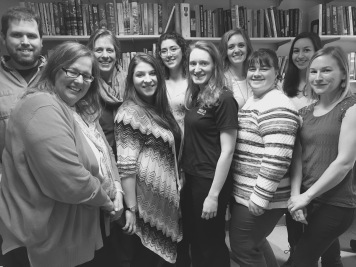The Project
What can the artifacts, materials, and objects we leave behind say about our lives? The combs, dolls, writing slates, sewing needles, scraps of clothing, and pieces of pottery pulled out of the ground at the Dorchester Industrial School for Girls site left clues about the lives of the women and girls who made their home at the school. But who were these women? Why were they there? What were their stories, and could they be uncovered from the recesses of time?

A piece of writing slate uncovered at the dig still bears the name carefully carved by its owner, Lilly.
(Boston City Archaeology Program)
To find out, Boston City Archaeologist Joseph Bagley and his team partnered with public historian Dr. Jane Becker and her graduate students at the University of Massachusetts, Boston. Inspired by the preliminary research of two UMass Boston historical archaeology graduate students on Joe Bagley’s team – Sarah Johnson and Madelaine Penney – in spring semester 2017, members of the graduate history seminar, Interpreting History in Public: Approaches to Public History Practice, began extensive biographical research into 16 women and girls who studied, worked, and lived at the Dorchester Industrial School for Girls.
Based on the thousands of objects found at the site, public history students at UMass Boston began their research in 1860—more specifically with the 1860 census. This public census listed 33 women and girls who lived at the school that year. Each public history graduate student began research on two subjects: one woman (staff or manager/officer) and one student. With little more than their subjects’ names and definitive location in 1860, the historians worked backward to find official records, personal papers, and photographs. UMass and the Boston City Archaeology team also worked with the Howard Gotlieb Archival Research Center at Boston University, which generously made the records of the Dorchester Industrial School for Girls accessible to our team, and facilitated use of the collection for this website. The material culture retrieved from archaeology at the School’s site, and the ISFG admissions logs and secretary records provide rich historical resources.

The First Research Team.
Back Row: Boston City Archaeologist, Joe Bagley; Dr. Jane Becker; Nina Rodwin; Sarah Black; Caroline Littlewood. Front Row: Laurie Kearney; Taylor Finch; Genevieve Peterson; Donna Russo; Genevieve Wallace.
What researchers found not only sheds light on the inner workings of the ISFG, but also uncovers the lives of the individual women and girls who walked its halls. From these lives, two distinctive narratives emerge: the benevolent work of middle-class women in Victorian Boston, and the often tumultuous lives of poor, marginalized girls in the very same city. Select a name below to explore these incredibly diverse stories and the extraordinary women who lived them.
:: STUDENT BIOGRAPHIES ::
Adelaide “Addie” Ross
Amelia McGee
Anne Barrett
Anne Jane “Jennie” Sherwood
Christina “Tiny” Bixby
Della Collins
Ellen Driscoll
Eudora “Dora” Stockwell
Eliza McTeer
Ida Hackett
Josephine Wentworth
Margaret “Maggie” Hasson
Mary Dobson
The Patterson Sisters
…
:: STAFF BIOGRAPHIES ::
Mary E. Parkman – President
Mary S. Daüble – Matron
Harriet T. Kittredge – Assistant Matron
Sophia N. French – Teacher
Eliza A. Guild & Eliza Q. Guild – Managers
Emeline A. Everett – Manager / Secretary
Emily T. Parker – Manager / Secretary
Helen M. Philbrick – Manager / Secretary
Martha R. May – Secretary
